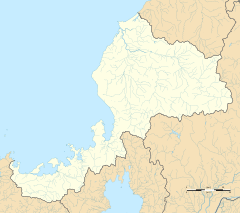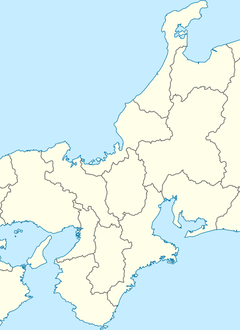Tsuruga Station (敦賀駅, Tsuruga-eki) is a joint-use railway station in the city of Tsuruga, Fukui, Japan, jointly operated by West Japan Railway Company (JR West) and Hapi-Line Fukui. The station premises are managed by JR West. It is served by the Hokuriku Shinkansen, the Hokuriku Main Line, the Obama Line and the Hapi-Line Fukui Line, all of which terminate at Tsuruga. A freight-only branch Line known as the Tsuruga Port Line operated by JR Freight formerly ran from this station.
A 01 B 08 Tsuruga Station 敦賀駅 | ||||||||||||||||||||||||||||||||
|---|---|---|---|---|---|---|---|---|---|---|---|---|---|---|---|---|---|---|---|---|---|---|---|---|---|---|---|---|---|---|---|---|
 Tsuruga Station in September 2018 | ||||||||||||||||||||||||||||||||
| General information | ||||||||||||||||||||||||||||||||
| Location | 1-1-24 Kanawa-cho, Tsuruga City, Fukui Prefecture 914-0026 Japan | |||||||||||||||||||||||||||||||
| Coordinates | 35°38′41″N 136°4′36″E / 35.64472°N 136.07667°E | |||||||||||||||||||||||||||||||
| Operated by | ||||||||||||||||||||||||||||||||
| Line(s) | ||||||||||||||||||||||||||||||||
| Platforms | 3 island platforms | |||||||||||||||||||||||||||||||
| Tracks | 7 | |||||||||||||||||||||||||||||||
| Connections | Bus terminal | |||||||||||||||||||||||||||||||
| Construction | ||||||||||||||||||||||||||||||||
| Structure type | At grade | |||||||||||||||||||||||||||||||
| Other information | ||||||||||||||||||||||||||||||||
| Status | Staffed ("Midori no Madoguchi") | |||||||||||||||||||||||||||||||
| Station code |
| |||||||||||||||||||||||||||||||
| Website | Official website | |||||||||||||||||||||||||||||||
| History | ||||||||||||||||||||||||||||||||
| Opened | 10 March 1882 | |||||||||||||||||||||||||||||||
| Passengers | ||||||||||||||||||||||||||||||||
| FY2016 | 3,610 daily | |||||||||||||||||||||||||||||||
| Services | ||||||||||||||||||||||||||||||||
| ||||||||||||||||||||||||||||||||
| ||||||||||||||||||||||||||||||||
Lines
editTsuruga Station is served by the Hokuriku Main Line and is located 45.9 kilometres (28.5 miles) from the other terminus of the line at Maibara. Trains of the Kosei Line also continue past their nominal terminus at Ōmi-Shiotsu to terminate at this station. As of March 2024, the Hokuriku Shinkansen now serves Tsuruga and is located 574.7 kilometres (357.1 miles) from the terminus at Tōkyō. The station is also a terminus of the 84.3-kilometre (52.4-mile) Obama Line to Higashi-Maizuru.
Station layout
editThe station has three island platforms serving seven tracks. It has a "Midori no Madoguchi" staffed ticket office. The station platforms were rebuilt in December 2012, while a new station building was completed at the end of 2013. The overhead line power supply changes between 1,500 V DC and 20 kV AC (60 Hz) at this station (Hokuriku Main Line only).
Platforms
edit| 1-2 | ■ Obama Line | for Obama and Higashi-Maizuru |
| 3 | ■ Hapi-Line Fukui Line | for Fukui, Kanazawa |
| 4 | ■ Hokuriku Main Line | Kosei Line Special Rapid / Local services for Maibara and Osaka |
| 5 | ■ Hokuriku Main Line | Kosei Line Special Rapid / Local services for Maibara and Osaka |
| 6 | ■ Hokuriku Main Line | for Maibara, Osaka |
| 7 | ■ Hapi-Line Fukui Line | for Fukui, Kanazawa |
| ■ Hokuriku Main Line | for Maibara, Osaka | |
| 31-32 | ■ Arrival Only | - |
| 33-34 | ■ Hokuriku Main Line | Limited Express Thunderbird for Osaka and Shirasagi for Nagoya |
| 11-14 | ■ Hokuriku Shinkansen | for Kanazawa and Tokyo |
-
Tsuruga Station in September 2012
-
New station building in August 2014
-
Midori no Madoguchi ticket office in September 2018
-
Driving wheel monument in August 2006
Adjacent stations
edit| « | Service | » | ||
|---|---|---|---|---|
| Hapi-Line Fukui Line (Tsuruga - Daishoji) | ||||
| Terminus | Rapid | Imajō or Nanjō | ||
| Terminus | Local | Minami-Imajō | ||
History
editTsuruga Station opened on 10 March 1882.[1] With the privatization of JNR on 1 April 1987, the station came under the control of JR West.[2]
Station numbering was introduced in March 2018 with Tsuruga being assigned station number JR-A01 for the Hokuriku Main Line and JR-B08 for the Kosei Line (despite the latter formally terminating at Omi-Shiotsu).[3][4]
The Hokuriku Shinkansen was extended to Tsuruga Station effective the timetable revision on 16 March 2024.[5][6] As of the same date, the Hapi-line Fukui Line began operations on the section of the Hokuriku Main Line to Daishoji formerly owned by JR West.
Future plans
editFrom October 2014, a gauge-changing test track was scheduled to be built next to the station on the site of the former motive power depot. The 180 m long test track will be used to test an experimental variable-gauge bogie, which can be changed from 1,435 mm (4 ft 8+1⁄2 in) to 1,067 mm (3 ft 6 in) and vice versa. The aim is to prove durability in cold and snowy conditions with a view to using the variable-gauge Gauge Change Train on through services between the standard-gauge Hokuriku Shinkansen and narrow-gauge Hokuriku Main Line in the future.[7]
Passenger statistics
editIn fiscal 2016, the station was used by an average of 3,610 passengers daily (boarding passengers only).[8]
Surrounding area
edit- Tsuruga Public Library
- Fukui University, Tsuruga campus
See also
editReferences
edit- ^ 日本国有鉄道停車場一覧 [JNR Station Directory]. Japan: Japanese National Railways. 1985. p. 43. ISBN 4-533-00503-9.
- ^ Ishino, Tetsu, ed. (1998). 停車場変遷大辞典 国鉄・JR編 [Station Transition Directory - JNR/JR]. Vol. II. Japan: JTB. p. 132. ISBN 4-533-02980-9.
- ^ "近畿エリアの12路線 のべ300駅に「駅ナンバー」を導入します!" ["Station numbers" will be introduced at a total of 300 stations on 12 lines in the Kinki area!]. westjr.co.jp (in Japanese). 20 July 2016. Archived from the original on 16 November 2022. Retrieved 30 December 2022.
- ^ "「駅ナンバー」一覧表" ["Station number" list] (PDF). westjr.co.jp (in Japanese). 20 July 2016. Archived from the original (PDF) on 16 November 2022. Retrieved 30 December 2022.
- ^ "Hokuriku Shinkansen's Kanazawa-Tsuruga extension set to open Saturday". The Japan Times. 14 March 2024. Archived from the original on 14 March 2024. Retrieved 16 March 2024.
- ^ "並行在来線「ハピラインふくい」開業 記念グッズに目輝かせるファンも" [Parallel conventional line "Hapi-Line Fukui" opens as commemorative goods go on sale]. Fukui Keizai Shimbun. 16 March 2024. Retrieved 16 March 2024.
- ^ "フリーゲージトレイン実験線を開設、JR西" [JR West to build a Gauge Change Train test track]. Tetsudo.com (in Japanese). Japan: Asahi Interactive Inc. 18 September 2014. Retrieved 19 September 2014.
- ^ 駅別JR貨客輸送状況(1日平均) [Station passenger figures (Fiscal 2016)] (PDF) (in Japanese). Japan: Fukui Prefectural Government. 2017. Retrieved 2 May 2018.
External links
edit- JR West station information (in Japanese)


